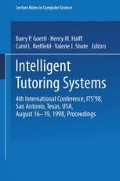Abstract
In the past, Knowledge Acquisition represented a barrier for developing intelligent systems, and particularly intelligent tutoring systems. In a recent work we proposed a model (Monaco-T ) for structuring and representing cooperative tasks. These tasks can be used directly in a cooperative learning environment, or in a simulation environment able to show how the cooperative task is effectively realized. To help experts representing knowledge with this model, we have built an editor able to produce tasks in Monaco-T format. The editor has graphic capabilities for editing rules, trees and layers, that are the basic elements of Monaco-T. Our editor also provides tools to directly link cooperative tasks to an external system able to react to direct manipulation. It represents an environment for component oriented programming.
Access this chapter
Tax calculation will be finalised at checkout
Purchases are for personal use only
Preview
Unable to display preview. Download preview PDF.
Bibliography
Aimeur, E. et Frasson, C. (1996). Analyzing a New Learning Strategy According to Different Knowledge Levels In Computers Educ volume 27 Numbers 2, pp 115–127.
Boose, J.H.. (1989). A survey of knowledge acquisition techniques and tools. Knowledge Acquisition, March, 1(1), 3–37
Card, S., Moran, T. & Newell, A. (1983). The Psychology of Human-Computer Interaction, Hillsdale, NJ: Erlbaum.
Chan T.W. et Baskin A.B.(1990). Learning companion systems. InIntelligent Tutoring Systems: At the Crossroad of Artificial Intelligence and education (Edited by Frasson C. And Gauthier G.) Chap. 1. Ablex, N.J.
Djamen J.Y. (1995). Une architecture de STI pour l’analyse du raisonnement d’un apprenant. Thèse de Ph.D., DIRO, Université de Montréal, Montréal, CANADA, Juin 1995.
Ellis, C., Gibbs, S.J., et Rein, G.L. (1991). Groupware: Some issues and experiences. CACM, 34(1), pp. 38–58.
Frasson C., Mengelle T., Aimeur E., Gouarderes G, (1996). An Actor-Based Architecture for Intelligent Tutoring Systems, In The Proceeding of Thirth international Conference of Intelligent Tutoring Systems, June, Montreal, Canada.
Brian R Gaines & Mildred L G Shaw. (1992). Eliciting Knowledge and Transferring it Effectively to a Knowledge-Based System In IEEE Transactions on Knowledge and Data Engineering September 1992
Brian R Gaines. (1988). An Overviwe of Knowledge-Acquisition and Transfer In Knowledge Acquisition for Knowledge-Based Systems, Gaines, B.R & Boose, J.H., Eds, Knowledge-Based Systems, Vol.1, New York: Academic Press, 3–22
Nkambou, R., Gauthier, G., (1996) Un modèle de représentation de connaissances dans les STI. In Proceeding of 3th International Conference on Intelligent Tutoring System ITS96. Springer-Verlag.
Schmidt, K. et Bannon, L. (1992). Taking CSCW Seriously. In Computer Supported Cooperative Work Journal, 1,1, pp. 7–40.
Tadie, G.S., Rossignol, J-Y, Frasson, C. et Lefebvre, B. (1997). Collaborative Learning System in Industry. In Demonstration at the Second Annual Conference on the TeleLearning NCE, November 4–6, 1997, Toronto, Canada.
Tadié, G.S., (1996) Coopération et Système Tutoriel Intelligent. Rapport de l’examen prédoctoral oral. Département d’Informatique et de Recherche Opérationnelle. Université de Montréal.
Tadie, S., Lefebvre, B. et Frasson, C. (1996). Monaco-T âache: un modèle à nature coopérative pour la modélisation de tâche dans un STI. In The Proceeding of Thirth international Conference of Intelligent Tutoring Systems, June, Montreal, Canada.
Terveen, L.G. (1995). Overview of human-computer collaboration. In Knowledge-Based Systems volume 8 Numbers 2–3.
Author information
Authors and Affiliations
Editor information
Editors and Affiliations
Rights and permissions
Copyright information
© 1998 Springer-Verlag Berlin Heidelberg
About this paper
Cite this paper
Tadié, S.G., Rossignol, JY., Frasson, C., Lefebvre, B. (1998). An Interactive Graphical Tool for Efficient Cooperative Task Acquisition Based on Monaco-T Model. In: Goettl, B.P., Halff, H.M., Redfield, C.L., Shute, V.J. (eds) Intelligent Tutoring Systems. ITS 1998. Lecture Notes in Computer Science, vol 1452. Springer, Berlin, Heidelberg. https://doi.org/10.1007/3-540-68716-5_26
Download citation
DOI: https://doi.org/10.1007/3-540-68716-5_26
Published:
Publisher Name: Springer, Berlin, Heidelberg
Print ISBN: 978-3-540-64770-6
Online ISBN: 978-3-540-68716-0
eBook Packages: Springer Book Archive

